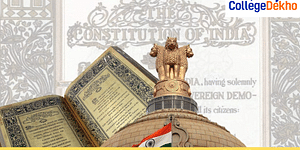Media Law
Media Law Overview
Media law encompasses the legal framework governing telecommunications, broadcasting, advertising, and the entertainment sector. It pertains to various forms of media, including television, radio, print media, and the rapidly expanding realm of social and digital media. This legal discipline addresses crucial aspects such as censorship, intellectual property, and information technology. It is important to note that not all media types adhere to identical regulations and guidelines. For instance, the laws pertaining to social media are continuously evolving to accommodate emerging platforms. Furthermore, media regulations vary across countries, reflecting diverse regulatory frameworks worldwide.
Table of Contents
- Media Law Overview
- Media Law Highlights
- Why study Media Law?
- Eligibility Criteria for Media Law
- Types of Media Law Courses
- Media Law Entrance Exams
- Media Law Course Fees
- Media Law Syllabus and Subjects
- Skills Required To Pursue Media Law
- Media Law Scope in India
- Media Law Salary
- Media Law Career Options and Job Prospects
- FAQs about Media Law
Media Law Highlights
The key highlights related to the media law courses are as follows:
| Particulars | Details |
|---|---|
| Course Name | Media Law |
| Course Duration | 1 - 3 years |
| Course Types | Undergraduate degree, Postgraduate degree, PG Diploma, PG Certificate |
| Eligibility Criteria | Passed class 12th from a recognized school board and/ or Passed graduation from a recognized institute for postgraduate media law courses |
| Employment Scope | Telecommunications, broadcasting, advertising, and the entertainment industry |
| Media Types | Television, radio, print media, social media, digital media |
| Legal Areas | Censorship, intellectual property, information technology |
| Evolving Nature | Social media laws continuously evolve and adapt to new platforms |
| International Variations | Different countries have varying regulations and legal frameworks for their respective media industries |
Why study Media Law?
Studying Media Law offers numerous benefits and reasons for individuals to delve into this field. Here are some key reasons to study Media Law:
Protection of Rights: Media Law provides a comprehensive understanding of the legal frameworks that safeguard freedom of speech, expression, and information. It enables individuals to navigate and protect their rights in the ever-evolving media landscape.
Legal Compliance: Media professionals, including journalists, broadcasters, and content creators, must comply with legal regulations. Studying Media Law equips individuals with the knowledge to ensure their work aligns with legal requirements and avoids potential legal issues.
Ethical Considerations: Media Law explores ethical dilemmas and considerations within the media industry. It encourages critical thinking and ethical decision-making, promoting responsible and balanced media practices.
Intellectual Property Protection: Media Law covers intellectual property rights, including copyright and trademark laws. Understanding these principles helps individuals protect their creative works and avoid infringing upon the rights of others.
Media Regulation: Media Law sheds light on the regulatory frameworks governing various media sectors. It delves into issues such as censorship, defamation, privacy, and advertising regulations. This knowledge is valuable for media professionals and organizations in complying with legal requirements.
Media Industry Insight: By studying Media Law, individuals gain insight into the inner workings of the media industry. They become familiar with industry-specific contracts, licensing agreements, and negotiations, enabling them to navigate the business aspects of media effectively.
Media Innovation and Technology: Media Law also explores the legal implications arising from technological advancements, such as social media platforms, digital content distribution, and data privacy. This knowledge is essential for understanding the legal challenges and opportunities brought about by media innovation.
Advocacy and Policy: A strong understanding of Media Law empowers individuals to advocate for media-related policy changes and reforms. It enables them to contribute to discussions on media regulation, media ethics, and the protection of individual rights.
Overall, studying Media Law provides individuals with the necessary legal knowledge and skills to navigate the complexities of the media industry, protect their rights, and contribute to a responsible and ethical media landscape.
Eligibility Criteria for Media Law
The eligibility criteria for studying Media Law may vary depending on the educational institution or program offering the course. However, here are some common eligibility criteria that individuals may need to meet:
Educational Background: Most programs require applicants to have completed a bachelor's degree in law (LLB) or a related field. Some institutions may also consider applicants with degrees in journalism, communication, or media studies, provided they have a strong interest in media law. Candidates must also have completed their class 12th from a recognized school board.
Minimum Academic Requirements: Applicants are typically expected to meet minimum academic requirements, such as a certain grade point average (GPA) or equivalent academic performance, as specified by the institution.
Entrance Examinations: Some institutions may require applicants to take entrance examinations, such as the Law School Admission Test (LSAT) or other relevant aptitude tests, to assess their analytical and critical thinking skills.
Work Experience: While not always mandatory, some programs may prefer applicants with relevant work experience in the field of law, journalism, media, or related industries. Work experience can demonstrate real-world expertise and a dedication to the industry.
Language Proficiency: Since the study of Media Law involves extensive reading, research, and legal analysis, applicants may be required to demonstrate proficiency in the language of instruction, usually English.
Letters of Recommendation: Applicants may need to submit letters of recommendation from professors, employers, or professionals who can attest to their academic abilities, work ethic, and potential to succeed in the field of Media Law.
Statement of Purpose: Many institutions ask applicants to submit a statement of purpose or personal statement explaining their motivation for studying Media Law, career goals, and how the program aligns with their aspirations.
It's important to note that specific eligibility criteria may vary between institutions and programs. It is advisable to thoroughly review the requirements outlined by the educational institution offering the Media Law program or consult their admissions department for accurate and up-to-date information.
How To Apply?
In addition to meeting the necessary eligibility requirements, the application process for admission to a media law course varies among different institutes. Candidates are advised to inquire about the specific procedures for their desired courses.
Generally, candidates need to register and complete an application form found on the college website. Knowing the application deadline is essential. Additionally, candidates must submit their academic transcripts for verification. Some colleges may also conduct entrance exams to assess the candidate's suitability for the course. Most colleges accept online application forms, simplifying the process for candidates.
Key steps for students include:
- Complete the online application form given by the university.
- Provide the required documents as proof of meeting the minimum eligibility criteria.
- Pay the application fee, typically a one-time payment.
- Submit a Statement of Purpose if requested.
- Include a Resume or Curriculum Vitae as part of the application.
- In some cases, LSAT scores may be required.
- Students are advised to refer to the official university website for the specific application process details.
Document Requirements
The documents required for media law courses admission are as follows:
- Application Form
- Academic Transcripts
- Degree Certificate
- Statement of Purpose
- LSAT scores or other required scores
- Resume or Curriculum Vitae (CV)
- Letters of Recommendation
- Writing Samples or Portfolio
It's important to note that the document requirements may vary between institutions and programs. Applicants should carefully review the specific requirements outlined by the educational institution offering the Media Law course or consult their admissions department for accurate and up-to-date information.
Types of Media Law Courses
There are various types of Media Law courses available that cater to different educational levels and interests. Here are some common types of Media Law courses:
Undergraduate Courses: These courses are typically offered as part of a Bachelor's degree program in Law or Media Studies. They provide a foundational understanding of media law principles, covering topics such as freedom of speech, defamation, copyright, and media regulation.
Postgraduate/ Graduate Courses: These courses are designed for individuals who already hold a Bachelor's degree and wish to specialize in Media Law. They offer an in-depth exploration of advanced legal concepts and emerging issues in media regulation, intellectual property, privacy, and digital media law.
PG Diploma in Media Law: It is a specialized program that provides advanced knowledge and skills in the legal aspects of the media industry. It focuses on topics such as media regulation, intellectual property, defamation, and digital media law. Ideal for law graduates and professionals seeking expertise in media law.
LLM (Master of Laws) in Media Law: An LLM in Media Law is a postgraduate program that provides advanced legal education in the field of media law. It is suitable for law graduates or legal professionals seeking to specialize in media-related legal practice or research. These programs delve deep into media regulation, media ethics, intellectual property rights, and media-related litigation.
Continuing Legal Education (CLE) Courses: These short-term courses or workshops cater to legal professionals seeking to enhance their knowledge of media law or stay updated on the latest developments in the field. CLE courses cover a range of topics, such as media litigation, digital media law, and the intersection of technology and media regulation.
Online Media Law Courses: With the rise of online education platforms, there are now numerous online courses and certifications focused on media law. These courses offer flexibility and accessibility, allowing individuals to learn at their own pace and acquire specialized knowledge in media law from renowned institutions.
These are just a few examples of the types of Media Law courses available. The specific offerings may vary between educational institutions and countries. It is advisable to research and explore the programs and courses offered by universities, law schools, and professional organizations to find the most suitable option based on your educational background and career goals.
Media Law Entrance Exams
In India, various entrance exams are conducted for admission to Media Law courses. Here are some commonly recognized entrance exams:
- CLAT
- AILET
- LSAT India
- IPU CET
- SET Law
- Christ University Law Entrance Exam
It's important to note that specific entrance exams may vary between universities and institutions offering Media Law courses. Prospective students are advised to research and refer to the official websites of the respective universities or institutions to obtain accurate and up-to-date information regarding entrance exams and their syllabus, eligibility criteria, application processes, and important dates.
Media Law Course Fees
The course fees for Media Law courses in India can vary significantly depending on the institute, program duration, and level of study. It is important to note that the fees mentioned below are approximate and subject to change. Here is a general range of course fees for Media Law courses in India:
Undergraduate Programs (3-5 years): Depending on the reputation of the university and whether it is a public or private institution, the annual tuition fees for undergraduate programs in Media Law normally range from INR 50,000 to INR 5,00,000.
Postgraduate Programs (1-2 years): For postgraduate Media Law programs, the course fees can range from INR 1,00,000 to INR 10,00,000 per year, again depending on factors such as the institute's standing and whether it is a public or private university.
Diploma and Certificate Courses: Diploma or certificate courses in Media Law, which are generally of shorter duration, may have fees ranging from INR 10,000 to INR 2,00,000, depending on the institution and the specific course content.
It is worth noting that these figures are indicative and can vary significantly depending on the specific institute, location, and course offerings. Additionally, some institutions may offer scholarships, financial aid, or installment payment options to assist students with the course fees. Prospective students are advised to visit the official websites of the universities or institutions offering Media Law courses to obtain accurate and up-to-date information on the course fees for their desired programs.
Media Law Syllabus and Subjects
The tabulated data below captures the media law syllabus:
| Media and the Society | Contempt of Court |
|---|---|
| Morality, Obscenity and Censorship | Parliamentary Privileges, Judicial Reporting and the Media |
| Right to Information | Media and the Constitution |
| Defamation | Cinema and the State |
| Broadcasting | Investigative Journalism and the Right to Privacy |
| Media and Ethics | Media and the Law |
| Advertisement and the Law | Electronic Media and Regulatory Law |
| Copyright Law | First Amendment & Art |
| Copyright & Art | Comedy, Choreography, & Creative Commons |
| Patents | Privacy & Art |
| Right to Privacy | Restrictions on freedom of speech and expression |
| Historical background of Freedom of Speech and expression in India | Right to Information |
Media Law Subjects
In a Media Law curriculum, there are core subjects that provide a foundational understanding of legal principles and regulations pertaining to the media industry. Additionally, there may be optional subjects that allow students to specialize in specific areas of interest. While the specific subjects offered may vary between institutions, here is a list of common core and optional subjects in Media Law:
Core Subjects:
- Introduction to Media Law
- Constitutional Law and Freedom of Expression
- Intellectual Property Law (Copyright, Trademark, and Patents)
- Defamation Law and Reputation Management
- Privacy and Data Protection
- Media Regulation and Ethics
- Entertainment Law
- Advertising and Marketing Law
- Telecommunications Law
- Digital Media Law and Internet Regulation
Optional Subjects (may vary):
- Media and Entertainment Contracts
- Media Litigation and Dispute Resolution
- International Media Law
- Sports Law and Broadcasting Rights
- Media Ethics and Professional Responsibility
- Media Policy and Advocacy
- Comparative Media Law
- Media and Gender Studies
- Copyright Licensing and Digital Rights Management
- Media and Technology Law
It's important to note that the availability of optional subjects may depend on the curriculum design of the specific institution or program. Students should consult the course catalogs or syllabi provided by the educational institution offering Media Law courses to get an accurate and detailed list of the subjects available in their chosen program.
Skills Required To Pursue Media Law
To pursue a career in Media Law, certain skills are beneficial for success in the field. Here are some essential skills required to pursue Media Law:
- Legal Knowledge
- Analytical Skills
- Research Skills
- Communication Skills
- Critical Thinking
- Negotiation and Mediation Skills
- Ethical Awareness
- Adaptability
- Attention to Detail
- Time Management
While these skills are valuable in pursuing a career in Media Law, it's important to continue developing and refining them through continuous learning, practical experience, and staying updated with the evolving legal landscape in the media industry.
Media Law Scope in India
Media Law has a wide scope in India due to the country's vibrant media landscape and the evolving legal and regulatory framework. Here are some aspects that highlight the scope of Media Law in India:
Media Industry Regulations: Media Law plays a crucial role in regulating the media industry, including television, radio, print media, digital media, and social media platforms. This involves ensuring compliance with laws related to content, advertising, intellectual property, privacy, defamation, and media ethics.
Freedom of Expression and Press Freedom: Media Law protects and upholds the freedom of expression and press freedom guaranteed by the Indian Constitution. It involves navigating legal challenges and balancing rights and responsibilities to safeguard the public's right to information and ensure responsible journalism practices.
Intellectual Property Protection: Media Law in India addresses intellectual property rights, including copyright, trademarks, and patents. This aspect is significant in protecting the creative works of media organizations and individuals, fostering innovation, and preventing unauthorized use or infringement.
Media Litigation and Dispute Resolution: Media Law practitioners handle litigation and dispute resolution related to media matters, including defamation cases, intellectual property disputes, contractual disputes, and media-related conflicts. This provides opportunities for legal professionals to specialize in media-related litigation and advocacy.
Media Ethics and Regulation: Media Law addresses ethical considerations in media practices, promoting responsible journalism, and ensuring fair and unbiased reporting. It also encompasses media self-regulatory bodies and the evolving role of digital media ethics and governance.
Emerging Media Technologies and Challenges: With the rapid growth of digital media, Media Law in India faces new challenges related to online content, social media platforms, data protection, cybersecurity, and privacy. Legal professionals specializing in these areas are in high demand.
Entertainment Industry: Media Law plays a vital role in the entertainment industry, encompassing film, music, television, and digital entertainment. It involves contract negotiations, copyright licensing, talent agreements, and addressing legal issues specific to the entertainment sector.
Media Policy and Advocacy: Media Law experts contribute to the formulation and analysis of media policies, advocating for regulatory reforms and shaping the legal framework governing the media industry in India. This includes engagement with government bodies, industry associations, and media organizations.
The scope of Media Law in India is expanding with the growth of digital media, evolving media consumption patterns, and the need for effective regulation in a diverse and dynamic media landscape. This offers diverse career opportunities for legal professionals, including media law practitioners, legal consultants, in-house counsels, legal advisors for media organizations, and policy analysts focusing on media and communications.
Media Law Salary
Upon completion of a Media Law course, individuals can expect competitive salaries depending on their job role and experience. Media Law attorneys can earn an average annual salary ranging from INR 6,00,000 to INR 12,00,000. Legal consultants and in-house counsels may earn between INR 5,00,000 to INR 10,00,000 per year. Salary ranges for legal advisors, policy analysts, and law professors vary from INR 4,00,000 to INR 20,00,000 annually, depending on their expertise and the employing organization.
A few of popular job profiles and their respective salaries in a media law domain are mentioned below:
Job Positions | Average Annual Salary (in INR) |
|---|---|
| Media Law Attorney | 6,00,000 - 12,00,000 |
| Legal Consultant | 5,00,000 - 10,00,000 |
| In-house Counsel | 7,00,000 - 15,00,000 |
| Legal Advisor | 5,00,000 - 10,00,000 |
| Policy Analyst | 4,00,000 - 8,00,000 |
| Law Professor | 8,00,000 - 20,00,000 |
Media Law Career Options and Job Prospects
Media Law graduates have diverse employment opportunities in various sectors that intersect with media and legal fields. Here are some top employment areas for media law graduates:
Law Firms: Media law graduates can join law firms specializing in media law, entertainment law, intellectual property law, or general practice firms that handle media-related cases.
Media Organizations: Media companies, including television networks, radio stations, publishing houses, production companies, and digital media platforms, hire media law graduates to handle legal matters and ensure compliance with media regulations.
Advertising Agencies: Advertising agencies often require legal expertise to navigate advertising laws, intellectual property rights, and compliance issues. Media law graduates can work as legal advisors or counsel in advertising agencies.
Broadcasting Regulatory Bodies: Regulatory bodies such as the Federal Communications Commission (FCC) in the United States or the Telecom Regulatory Authority of India (TRAI) hire media law professionals to enforce regulations, review licenses, and resolve legal disputes.
Government Agencies: Government departments related to media and communications, such as the Ministry of Information and Broadcasting, may have employment opportunities for media law graduates to provide legal advice, draft policies, and handle regulatory matters.
Nonprofit Organizations and Advocacy Groups: Nonprofits and advocacy organizations focusing on media rights, freedom of expression, and media ethics may hire media law graduates to support their legal advocacy efforts and research on media-related legal issues.
Academic Institutions: Universities and colleges employ media law graduates as professors or instructors to teach courses in media law, intellectual property law, media ethics, or related subjects.
Corporate Legal Departments: Media law graduates can work in the legal departments of media-centric corporations, including media conglomerates, entertainment companies, and digital media enterprises.
Independent Practice: Some media law graduates choose to establish their own legal practices, offering specialized legal services to media professionals, content creators, and media organizations.
Policy and Research Institutions: Think tanks, research institutions, and policy organizations focused on media, technology, and communications hire media law graduates for policy research, analysis, and advocacy work.
These employment areas provide media law graduates with opportunities to apply their legal expertise and contribute to the dynamic and evolving media landscape.
After completing a course in media law students can start seeking employment opportunities across various job profiles. Media law is a vast field and enlisted below are the possibilities you can circle out as your career option.
- Human Rights Lawyer
- Intellectual Property Lawyer
- Independent Lawyer
- Data Protection
- Digital Forensics
- Media & Entertainment Lawyer
- Media Legal Advisor
- Media Lawyer
FAQs about Media Law
Is a media law course more theory-based or practical-oriented?
A media law course in India typically includes a combination of theory and practical training. While the theoretical aspect provides an understanding of media laws and regulations, the practical component may involve internships or case studies to develop practical skills in handling media-related legal issues.
What is the fee structure for media law courses in India?
The fee structure for media law courses in India can vary depending on the university or institution offering the course. Generally, the fees for undergraduate media law courses range from INR 50,000 to INR 3 lakhs per year. Postgraduate media law courses may have fees ranging from INR 1 lakh to INR 5 lakhs per year.
Can I specialize in intellectual property law within the media law course?
Yes, it is possible to specialize in intellectual property law within a media law course. Media law courses often cover intellectual property rights, including copyright, trademark, and patent laws, as they are relevant to the media industry. Specializing in this area can provide a deeper understanding of intellectual property issues specific to media and creative industries.
Do media law courses cover international media laws and regulations?
Yes, media law courses often cover international media laws and regulations to provide students with a comprehensive understanding of the subject. They may explore topics such as cross-border defamation, jurisdictional issues, intellectual property rights in the global context, international treaties and agreements, and the impact of digital platforms on international media law. Understanding international media laws is essential in today's interconnected media landscape.
Can a media law course lead to opportunities in journalism or media management as well?
Yes, a media law course can lead to opportunities in journalism or media management. Understanding the legal aspects of media is crucial for journalists and media professionals to navigate the complex legal landscape. Additionally, knowledge of media law enhances skills in media management, including ensuring legal compliance, protecting intellectual property, and understanding media regulations, making graduates well-equipped for roles in journalism or media management.
What is the difference between media law courses and general law courses?
Media law courses specifically focus on the legal aspects pertaining to media, including regulations, rights, and responsibilities in the media industry. They delve into subjects such as defamation, privacy, intellectual property, freedom of speech, media ethics, and emerging digital media issues. In contrast, general law courses provide a comprehensive understanding of various branches of law, covering diverse areas such as criminal law, contract law, constitutional law, and more, without the specific emphasis on media-related legal matters.
Can I work as a media lawyer in both print and digital media sectors?
Yes, as a media lawyer in India, you can work in both print and digital media sectors. With the rise of digital media platforms, the scope of media law has expanded to cover various legal aspects of online content, social media, and digital publishing. Media lawyers play a crucial role in addressing legal issues and ensuring compliance in both traditional and digital media environments.
Are there any scholarships or financial aid available for media law students?
Yes, there are scholarships and financial aid options available for media law students in India. Many universities and colleges offer scholarships based on academic merit, financial need, or specific criteria related to media law. Additionally, various government schemes, private organizations, and foundations provide scholarships, grants, or fellowships to support students pursuing legal education in the field of media law.
What is the scope of media law specialization in the current digital age?
In the current digital age, the scope of media law specialization has expanded significantly. Media lawyers are needed to navigate legal issues arising from online platforms, social media, digital content distribution, data privacy, and cybersecurity. They play a crucial role in ensuring compliance with evolving digital regulations and addressing emerging legal challenges in the rapidly evolving media landscape.
What is the average duration of internships during a media law course?
The duration of internships during a media law course can vary. It depends on the institution and the particular programme. Typically, internships can range from a few weeks to a few months. The purpose of internships is to provide practical exposure and hands-on experience in applying legal concepts to real-world media scenarios, enhancing students' understanding of media law in practice.
Are there any specific skills or qualities required to excel in a media law course?
The skills and qualities that can be beneficial for excelling in a media law course include strong analytical and critical thinking abilities, excellent research and writing skills, knowledge of current media trends, good communication and negotiation skills, attention to detail, ability to work under pressure, ethical awareness, and a keen interest in media-related legal issues and developments.
Can I pursue a media law course online or through distance learning?
Yes, it is possible to pursue a media law course online or through distance learning in India. Many universities and institutions offer media law programs through online platforms, allowing students to study at their own pace and convenience. These courses provide flexibility for working professionals or those unable to attend traditional classroom-based programs.
What are the job prospects for media law graduates in India?
The job prospects for media law graduates in India are promising. They can work as media lawyers, legal advisors, or consultants for media organizations, law firms, regulatory bodies, and government agencies. Opportunities also exist in journalism, broadcasting, digital media, entertainment industry, intellectual property firms, and academia.
What are the five types of Media Law?
The five types of media law are defamation law, privacy law, intellectual property law, access to information law, and media regulation law.
Are internships or practical training included in the media law course curriculum?
Yes, internships or practical training are often included in the media law course curriculum. These internships provide students with hands-on experience in legal research, drafting, and working with media-related cases. They offer valuable exposure to the practical aspects of media law and help in building professional networks.
Can I specialize in a specific area of media law during the course?
Yes, you can typically specialize in a specific area of media law during the course, such as defamation, intellectual property, privacy, or media regulation. Some institutions may offer elective courses or modules that allow you to focus on a particular aspect of media law based on your interests and career goals.
What career opportunities are available after completing a media law course?
After completing a media law course in India, career opportunities include working as a media lawyer, legal consultant for media organizations, intellectual property rights specialist, media regulatory expert, legal advisor for journalists, or pursuing a career in media management, journalism, or related fields requiring knowledge of media laws and regulations.
What are the top colleges in India to pursue Media law courses?
Top private and public colleges in India to pursue media law courses include National Law School of India University (Bangalore), Faculty of Law - University of Delhi (Delhi), Symbiosis Law School (Pune), Jindal Global Law School (Sonipat), School of Law - Christ University (Bangalore), ILS Law College (Pune), NALSAR University of Law (Hyderabad), and Government Law College (Mumbai). These institutions offer comprehensive media law programs with experienced faculty and strong academic reputations.
What is the duration of a media law course in India?
The duration of a media law course spans 1-3 years in India.
What is a media law course?
A media law course is an educational program that focuses on the legal aspects of media, including regulations, rights, and responsibilities. It covers topics such as defamation, privacy, intellectual property, freedom of speech, media ethics, and emerging legal issues in the media industry.
How to become a media lawyer in India?
To become a media lawyer in India, one must complete a five-year integrated law course or a three-year LLB program. After graduation, gaining practical experience through internships and joining law firms specializing in media law can provide relevant exposure and expertise in the field.
What is the scope of Media Law?
The scope of media law encompasses various legal aspects related to media, including defamation, privacy, intellectual property, freedom of speech, access to information, media regulation, and emerging issues in the digital age, ensuring legal compliance and protection of rights in media-related activities.
What is the salary of media lawyer in India?
The salary of a media lawyer in India can vary depending on factors such as experience, expertise, location, and the law firm they work for. On average, it can range from INR 4 lakhs to INR 15 lakhs per annum.
How can I study Media law in India?
Courses in media law are offered at the certificate, undergraduate, postgraduate, and PG Diploma levels. Certificate/ undergraduate programmes can last anything from a few weeks to a year or two, whereas PG Diploma programmes last two years and LLM in Media Law programmes last one to two years.
What is Media law in Indian Constitution?
Media law in the Indian Constitution primarily falls under the ambit of freedom of speech and expression guaranteed by Article 19(1)(a). However, it is subject to reasonable restrictions in the interest of sovereignty, security, public order, decency, morality, contempt of court, and defamation.
Related Questions
Popular Courses
- Courses
- Media Law


















